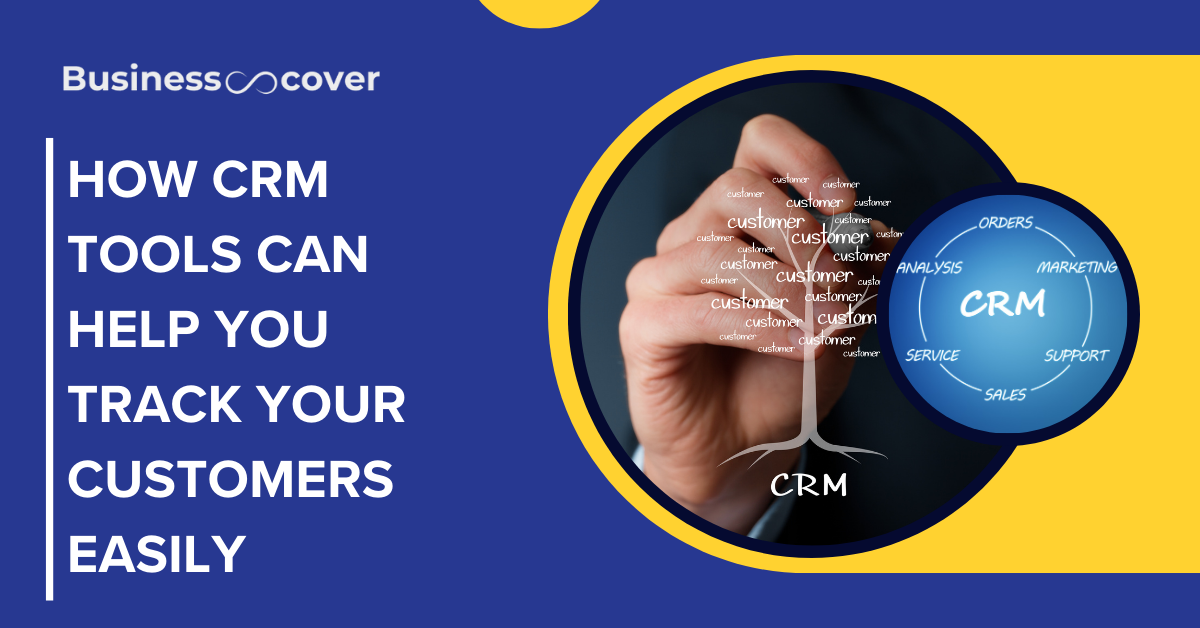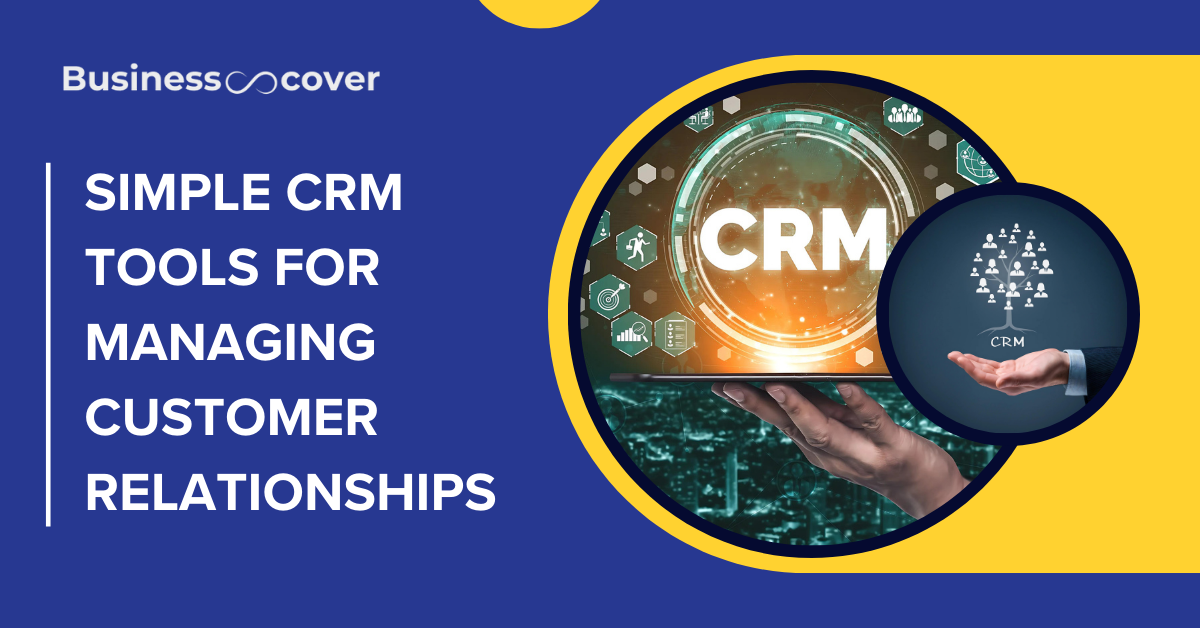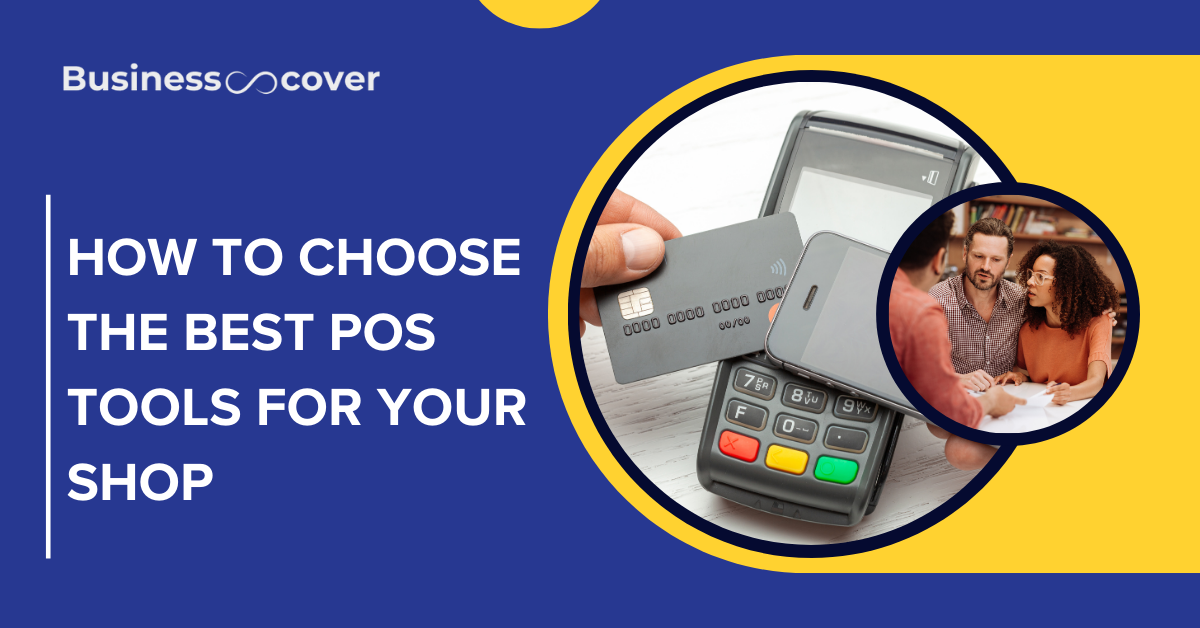Modern CRM tools are viewed as one of the essential elements that can actually help every single enterprise improve its customer monitoring processes. The consequences of customer relations in terms of customer interactions can be dealt with more effectively by CRM systems, offer a deeper insight of the customer relations, as well as help in making strategic decisions concerning customer support due to the collection and subsequent compilation of customer information.
Understanding CRM Tools
CRM as a software tool is intended for storing and analyzing such data, as well as for tracking and monitoring multiple contacts with a customer during his/her lifecycle. This technology improves the flow of materials throughout the company’s sales, marketing, and customer service departments, which guarantee that all those teams receive updated customer information.
Key Features of CRM Tools
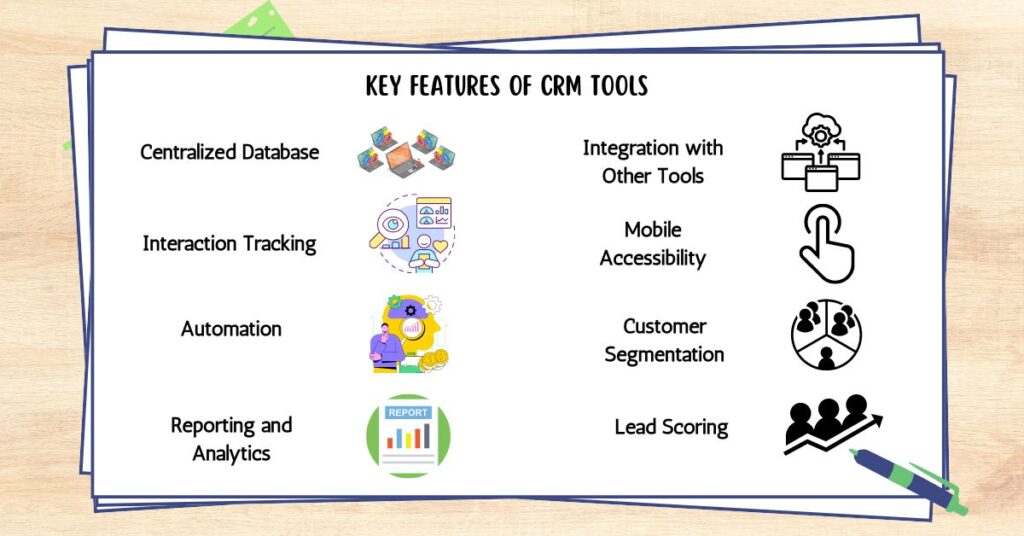
1. Centralized Database
CRM systems contain all the data of the clients, mainly their contact details, details of the purchase of their products, and interaction history. This centralization makes it easier to get key data to all members of the team. For example, a sales representative is able to access a client’s call history before making the sales’ call.
2. Interaction Tracking
Using CRMs you can track every touch point with customers no matter if it was through email, phone, or social media. This feature is useful in explaining customers’ current trends and their trend over time. For instance, if a customer enquires a number of times about certain products then the sales team can act accordingly.
3. Automation
A major capability possessed by many CRM tools is the ability to partially or fully automate processes of communicating with the customer, for example, follow-ups or appointment setting. Besides saving time it also eliminates some possibility of mistakes that can be made by people. It can also guarantee that no leads lapse out of the business owners’ memory and are followed up at the right time.
4. Reporting and Analytics
Sophisticated analysis features allow companies to evaluate and make forecasts based on customers information. Such information can be utilised to better understand the customer and enhance the marketing approaches. For example, merchant and service providers are able to determine the best time that their products are being demanded by the customers so as to launch a promotion.
5. Integration with Other Tools
The beauty of most CRM systems is that they can be connected to other business tools such as email marketing programs, social media management platforms, and e-commerce platforms. This integration enable a more systematic approaches of handling customer relations. For instance, connecting with an email marketing application can assist track the efficacy of campaigns straight inside the CRM.
6. Mobile Accessibility
Most of the current CRMs include the availability of mobile applications where members of a certain team can use to access some customer information. It can be most advantageous for sales representatives who occasionally have to amend data or verify some facts during a meeting with the client off the workplace.
7. Customer Segmentation
CRMs allow companies to categorize their customers depending on some factors like age, purchase pattern, or interactiveness. Such a segmentation helps a company to be able to market its products better to a particular group that will find the products more appealing than others.
8. Lead Scoring
Some of the CRM systems contain lead scoring capabilities that allow you to assess prospects depending on how they have been conducting themselves with your enterprise. Amid the vast number of leads that businesses often gather, it is economical to prioritize leads that are most likely to convert.
Also Read | Simple CRM Tools for Managing Customer Relationships
Benefits of Using CRM Tools
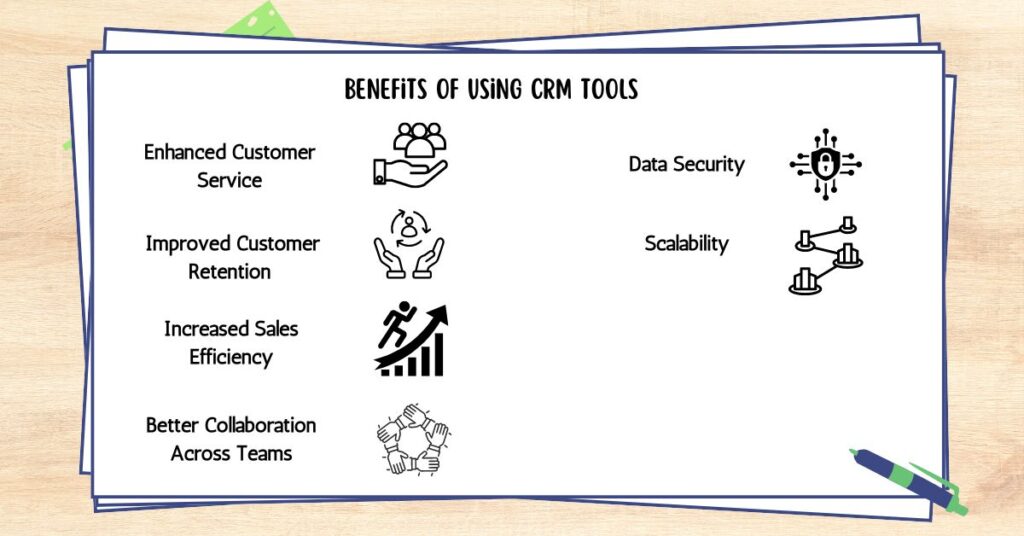
Implementing a CRM system can lead to numerous advantages for businesses
1. Enhanced Customer Service
When a support team receives detailed information regarding the customer, the resultant support provided to the customer shall satisfy the said entity and, therefore, garner higher satisfaction levels. For instance, information about their previous complaints enables the support agents to deal with customer problems more efficiently.
2. Improved Customer Retention
When the flow of daily communications’ and customers’ behaviors are being monitored, companies can reach out to customers with the needed support before the customer turns into an issue. This is found to strengthen customer loyalty as compared with a general reminder at a set interval or offering since the latter can be a long time after a valuable milestone where a customer may have made a purchase or could have been inclined to do so.
3. Increased Sales Efficiency
One considerable advantage when using CRM data coming from the field is that it helps the sales teams to locate particular prospects and opportunities that they would have not had knowledge of prior to the contacts with such companies to focus their energies and efforts thus making their task and work a lot easier. For instance, if a customer has visited the store website and used the search for a specific product but has not bought the product, the sales department can contact the customer with offers.
4. Better Collaboration Across Teams
Centralized applications make it easy for the various departments in an organization to nut out the customer history and interaction to and from all the other departments. Such an association assists in the development of integrated plans that improve the client encounter.
5. Data Security
In the contemporary models of CRM, there are better mechanisms of safety to minimize customer data loss or leakage. Some of the interface facets include; users with privilege to view specific kind of information are allowed while others are restricted.
6. Scalability
But as the organizations grow, their requirements also evolve in some way. Some CRM solutions are easily customizable and often organizations can add functionalities or expand the number of users as is desired without having to switch to a new system.
Choosing the best CRMs Suitable Tool
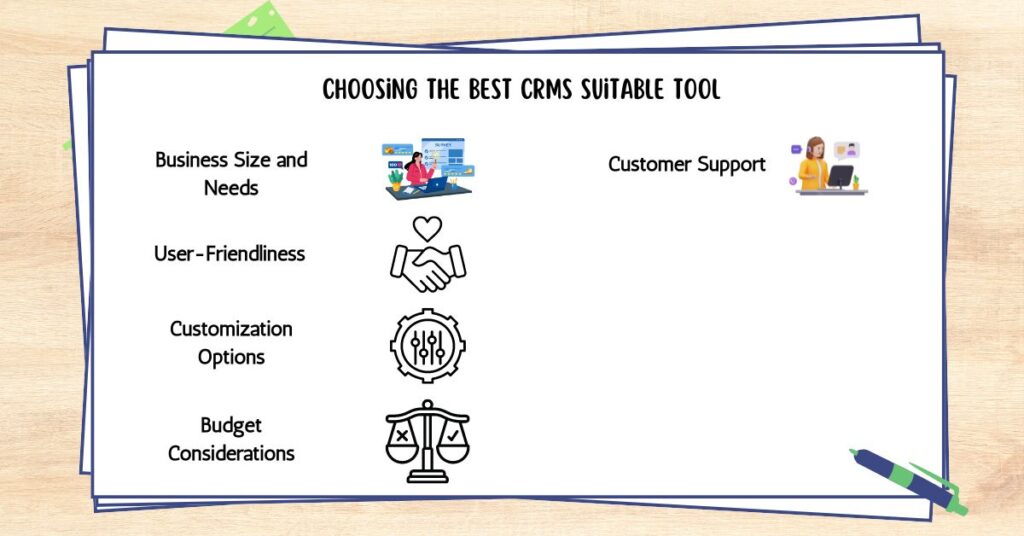
Take into account the following aspects while choosing a CRM tool
1. Business Size and Needs
Small and medium-sized companies may have basic needs for the tool to exhibit core features, whereas large enterprises require tools to demonstrate high levels of analysis and automaticity.
2. User-Friendliness
The interface has to be quite delicate so that all the members in a team should not be trained on how to operate the system. One critical disadvantage is that the system may prove to be highly complex to learn by many of the users across the organization.
3. Customization Options
There is always something special that the business needs as a workflow, and this is where one should focus on finding the CRMs that can be customized to meet such needs. With the help of defining new fields and personalizing the dashboards you are able to monitor the characteristics important for you and your business.
4. Budget Considerations
Compare the cost of the software to the services provided in order to determine if the cost will allow you to get everything that you require. Do not only take into account first-time payments but also yearly, monthly or daily charges as well.
5.Customer Support
Technical support must always be strong when marketers introduce new software to their colleagues. Concerning support responsiveness and quality, you can check the reviews or as for references.
Conclusion
In today’s dynamic business environment, CRM tools are essential for managing customer relationships. They centralize data, automate processes, and provide insights into customer behavior, helping businesses offer personalized service. A well-implemented CRM system improves customer retention and acquisition by enhancing service delivery and marketing efforts. For long-term success, businesses need the right CRM to effectively manage and grow customer relationships. It’s a must-have tool.

